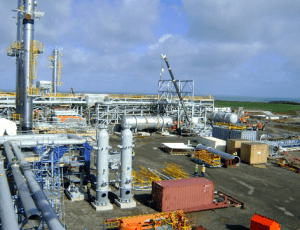Ghana government to establish GH¢1.5b infrastructure development fund soon
 The Minister of Trade and Industry, Dr. Ekow Spio-Garbrah says the GH¢1.5 billion Ghana Infrastructure Development Fund that was proposed in the 2015 Budget Statement would be established soon. He did not state a specific timeline.
The Minister of Trade and Industry, Dr. Ekow Spio-Garbrah says the GH¢1.5 billion Ghana Infrastructure Development Fund that was proposed in the 2015 Budget Statement would be established soon. He did not state a specific timeline.
He noted that this fund would be used to facilitate trade and industry, according to a GNA report.
He was speaking to the staff of the Western Regional Office of the Ghana Free Zones Board at Takoradi, during an unannounced visit, the report adds.
Meanwhile, in the 2000s infrastructure contributed just over one percentage point to Ghana’s annual per capital GDP growth, according to the World Bank. The Bank holds the view that raising the country’s infrastructure endowment to that of the region’s middle-income countries could boost the annual growth rate by more than 2.7 percentage points.
The Bank notes that Ghana has an advanced infrastructure platform when compared with other low-income countries in Africa.
“The country’s coverage levels for rural water, electricity, and GSM signals are impressive. A large share of the road network is in good or fair condition. Institutional reforms have been adopted in the ICT, ports, roads, and water supply sectors,” the Bank says.
It indicates that Ghana’s most pressing challenges lie in the power sector, where outmoded transmission and distribution assets, rapid demand growth, and periodic hydrological shocks leave the country reliant on high-cost oil-based generation, adding that exceptionally high losses in water distribution leave little to reach end customers, who are thus exposed to intermittent supplies.
“Addressing Ghana’s infrastructure challenges will require raising annual expenditures to $2.3 billion. The country already spends about $1.2 billion per year on infrastructure, equivalent to about 7.5 percent of GDP. A further $1.1 billion is lost each year to inefficiencies, notably underpricing of power. Ghana’s annual infrastructure funding gap is about $0.4 billion per year, chiefly related to power and water. Following its recent oil discoveries, Ghana can raise additional public funding from increased tax receipts. The country has several strong areas on which to build and a solid economic base from which to fund incremental efforts,” it says.
In its 2015 Budget Statement, the Ghana government proposed to set up the Ghana Infrastructure Fund (GIF) to deal with the huge infrastructure deficit and to focus on strategic infrastructure that will lead to job creation and the growth of the economy.
“The GIF will be a quasi-fiscal body that will be chaired by the Minister of Finance”, it said in the statement.
It added that in due course, it would pursue its own ―ratings on the domestic and international financial and capital markets.
“Indeed, independent ratings is a strategic move that government will encourage to enable these enterprises borrow on their own balance sheets or records,” it said.
It indicated that the GIF will focus on strategic infrastructure in partnership with the private sector.
By Emmanuel K. Dogbevi, with additional files from the GNA
